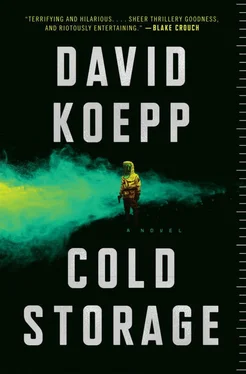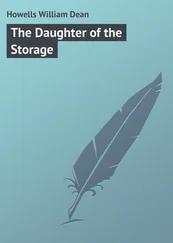As they made their noisy way down the corridor and into the depths of the storage facility, Cuba heard a sound to her left and turned to look. They were passing the open mouth of another hallway. She got a glimpse of a person: not a security guard, but a slightly puffy guy in too-tight jeans and a work shirt that was green-spattered and strained at the buttons, as if he’d put on a lot of weight recently and refused to buy new clothes. The guy was looking their way as he walked through another intersection a hundred feet away. They made eye contact and she found his look disconcerting, his face as swollen as the rest of him and his stare a bit too intense. She saw him only for a second or two and then he passed out of sight, moving parallel to them in the same direction, as if following them from one corridor away.
Cuba—who had not one ounce of Latina blood in her but did enjoy ropa vieja —wondered what kind of weirdo would hang out in a self-storage place at four o’clock in the morning.
She hurried to catch up with the others.
Trini turned off the lights when they were half a block away and rolled to a quiet stop on the suburban street. Roberto, who’d known enough not to ask questions of Trini until they were immediately relevant, asked the obvious one now. “Where are we going?”
Trini killed the engine, unzipped her purse, and rummaged around until she found a small rolled leather pouch. “Where item seven is.” She got out of the car, looked up and down the deserted street, and headed off, staying just beyond the throw of the infrequent streetlights.
Roberto got out, closed his door softly, and caught up. He didn’t say anything, just kept pace with her as she counted off the houses. The lights were out in all of them, no respectable person up at this hour. Trini stopped just before a pleasant-looking two-story, stepped up off the street, and started across the grass toward the house. She didn’t bother with the front door; instead she went into the narrow yard, about fifty feet of space between the house and the one next to it. She reached a side door, dropped to her knees on the cement slab just outside it, and unrolled the leather pouch on the ground in front of her. “A little light, please?”
Roberto pulled out a key chain with a tiny Maglite on it and bent down, to contain the beam. He clicked it on and held the beam on the pouch. As it rolled open the light glinted off a pick set, half a dozen metal tools of varying shapes and sizes. “Forget your keys?” he whispered.
Trini didn’t answer. The less he knew the better, so she offered nothing. She skimmed her fingers over the torsion wrench and the offset pick, glanced up at the style of the lock on the door, and selected an L rake. She wiggled it into the lock and maneuvered it carefully, listening.
Roberto looked around, then back at her in mild annoyance. “This is really the best storage plan you could come up with?”
“Worked for thirty years, didn’t it?” She kept wiggling the L rake but wasn’t getting anywhere, so she pulled it out, switched to a diamond offset pick, and went back to work with that. “Only pain in the ass was when they moved. Took me six weeks of very creative lying to get them to let me pack the basement by my— There we go!”
The lock had clicked. She turned it gently, using the pick. The door opened a crack. She slid the tools back into the leather roll, tied it quickly, and shoved it in the back of her pants as she stood up. She looked at Roberto, expecting praise but not getting any, then shrugged. There’s no pleasing some people. She opened the door and stepped inside. Roberto followed.
They were in a kitchen, a busy family one, from the looks of it. Even in the dark they could make out the counter, crowded with olive oil jugs and spice bottles and half-read books and somebody’s homework and assorted plastic crap. Trini nodded her head and Roberto followed her across the room, silently, to a section of the wall that was covered by a pinboard filled with kids’ drawings and ribbons and schedules and reminders. Trini reached down to a half-hidden handle, turned it, and opened the door. “Light again?”
Roberto shined his tiny Maglite ahead of them, revealing a staircase that led to a basement. They glided down the stairs. He kept his light on this time, shining a path ahead of Trini as she moved through the half-converted downstairs space, past the ratty sofa and the broken, permanently reclined recliner, around the bumper pool table, and to another door at the far end of the room.
She turned the handle and pushed into an unfinished storage room. The family had lived there for quite a while and there must have been a number of kids, spread out over a fairly wide age range, because there was everything down here from old Big Wheels to a rack of frequently used skis. The back half of the storage room was curtained off, and whatever was piled back there bulged, threatening to push right through the curtain. Trini pulled it aside.
The character of the stuff in the back half of the room was different. There was no kid paraphernalia back here, just a lot of beat-up old crates and cases packed on top of one another, unsentimental keepsakes like camp trunks and an old snowblower. There was a narrow path through the cases, a definite method to someone’s pack-rat madness, and Trini held her hand out for the light. Roberto gave it to her and she turned sideways, making her way between the cases toward the very back of the very back.
There was a large storage container there, locked in three places along its front edge. Trini pulled out a set of keys, handed the light back to Roberto, and opened the locks, then the lid. Inside the trunk was a large, flat wooden tray with divisions of all shapes and sizes, filled with colorful pieces of paper. Roberto’s first thought was that it was currencies—maybe Trini had a run box down here—but on closer examination the paper wasn’t money at all, it was much too small and square. Trini drew her breath in sharply, as if she’d forgotten what was in the box, and he flicked the light up to her face.
She was grinning like a six-year-old. “My stamp collection!” She ran her fingers lightly over the rows of neatly mounted stamps, sorted by country and continent, each one on a tiny piece of stiff cardboard, its date and origin neatly lettered beside it. She picked one up, fascinated. “Kampuchea! That’s rare!”
“Maybe not right this second?”
“Sorry. Forgot it was here.” She spread her arms out, reaching all the way to both sides of the five-foot-long box, and locked her hands around the wood frame of its top tray. She wiggled it a little and lifted, pulling the whole tray out, the way you would the top level of a footlocker. She turned, found a flat place nearby, and while she set it down, Roberto turned the light back to the trunk. Beneath the top shelf was a mountain of bubble wrap. He started pulling it aside, Trini turned back and pulled the rest out, and finally they uncovered what they’d come for.
The thing was big and shaped like a water barrel that had been cut in half vertically. The flat portion had a series of straps and ropes and buckles and clamps, and they wrapped around the barrel itself with three or four leather straps. As a container it was meant to be lightweight, but with that size there wasn’t much of a chance it actually was. The exterior was covered in a light-colored canvas, with some kind of hard shell underneath.
It was exactly as Roberto remembered it from thirty years ago. He wasn’t sure why he’d thought it would be any different. “Looks old.”
Trini shrugged. “So are we. We still work.”
True, but they were human bodies, meant to age and decay and malfunction from time to time, and the half-barrel backpack was a T-41 Cloudburst, a selectable-yield man-portable nuclear weapon. If Trini’s or Roberto’s body broke down, they’d die, and a few people would cry for a while. If the T-41 broke down, everybody within a ten-mile radius died.
Читать дальше
Конец ознакомительного отрывка
Купить книгу











